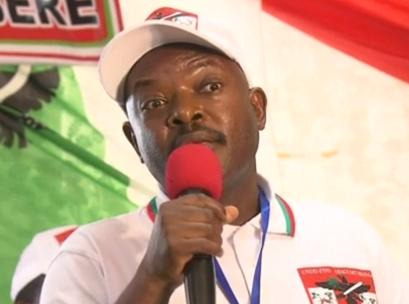The U.S., the E.U. and Western media continue to castigate Burundian President Pierre Nkurunziza for seeking a third term in office, despite violent street protest and a failed coup détat. Nkurunziza, who was elected by Burundi’s Parliament in 2005, claims that the Burundian Constitution gives him the right to run for election twice by universal suffrage. The country’s constitutional court confirmed that Nkurunziza has that right.
Russia and China blocked a U.N. Security Council resolution censuring Nkurunziza for seeking a third term and pointed out that Burundi is a sovereign nation that must be left alone to solve its own problems.
Ironically, one of the only voices in the Western press who has broken with the Western consensus by pointing to Burundi’s sovereignty is heard weekly on the Voice of America. On June 3, 2015, Shaka Ssali, the very popular African-born host of
Straight Talk Africa, compared the Burundian constitutional court’s decision to that of the Supreme Court regarding the 2005 U.S. election of George Bush:
“George W. Bush was not elected president of the United States in his first term. He was appointed by the Supreme Court of the United States of America, 5 to 4 verdict. And the five members who voted for him – they had been appointed by Republican presidents.
“People grumbled here and what have you, but life went on. So let’s be honest. You may not be in agreement with the decision of the Burundian constitutional court, but since the court has spoken, you have to accept it, no?”
Ssali was speaking to John Manirakiza, an international development consultant and member of the Burundian Diaspora in Washington, D.C. Manirakiza responded that the people of Burundi oppose Nkurunziza’s decision to run for election again. However, Agence France Presse (AFP), in one newswire that departed significantly from the rest of the Western press, reported that the protests have all occurred in Burundi’s capital, Bujumbura, and that Nkurunziza is immensely popular with Burundi’s rural peasant majority.
“Dancing and singing,” AFP reported, “thousands waited to greet the president as he visited this farming community on Saturday, some 30 kilometres (20 miles) outside the capital, Bujumbura.”
Shaka Ssali also argued that the Burundian Constitution became the law of the land when it was enacted in 2005, at which point it superseded the authority of the 1998 Arusha Peace and Reconciliation Agreement for Burundi, a document which the U.S. continues to invoke. In this, Ssali agrees with Rwandan legal scholar and attorney Charles Kambanda, who published his legal analysis in “The Rwandan.”
“He’s managed to reconstruct the country. He’s actually built more schools, by 2007, than were built before in the entire 50 years of independence. He’s instituted policies that have been very good for working people, with emphasis on infrastructure.
He’s managed to reconstruct the country. He’s actually built more schools, by 2007, than were built before in the entire 50 years of independence.
“He made a law actually, which requires people to provide free labor, community labor, on Saturdays to build schools and other public infrastructure that people need. So he has created a kind of a national voluntarism which has given people a sense of hope and a sense that they have power to build their country. He’s actually done very well and he spends a lot of his time with poor people on weekends, so he’s extremely popular.
“The government has made the claim that this problem, this violence, is really only in Bujumbura, the capital, and that is actually true. In most of the country there are hardly any protests. The foreign funded media tends to be concentrated in Bujumbura. But even in Bujumbura, you only have about four quarters of the capital where there’s violence. So this has really been blown all out of all proportion by the international press.”
In “
Are the US and the EU Sponsoring Terrorism in Burundi?” an essay published in Global Research, Colmáin said that Nkurunziza has fallen out of favor with the West by striking a deal with a Russian corporation to mine Burundi’s nickel reserves, and that the U.S. has engaged in a low intensity campaign to destabilize Burundi and the surrounding region. He blamed foreign funded media, especially private radio stations, for frightening the population to destabilize the country and the region in service to foreign interests.
Colmáin said that Nkurunziza has fallen out of favor with the West by striking a deal with a Russian corporation to mine Burundi’s nickel reserves, and that the U.S. has engaged in a low intensity campaign to destabilize Burundi and the surrounding region.
No one more adamantly challenged the Western consensus than Pan Africanist scholar
Dr. Randy Short, speaking to Press TV. Dr. Short said that the Burundian crisis is really all about the resources that Western powers are taking out of Burundi’s neighbor, the Democratic Republic of the Congo.
“Burundi is a conduit into Congo. Burundi is one of the poorest countries in the world. They don’t have anything. They [U.S. policy makers] care as much about Burundians as they do about the people in Baltimore who were rioting a few weeks ago. This is a sham. It’s a shibboleth. What it’s an effort to do is to steal from sovereign nations in Africa and to compete with the Chinese and the BRICs countries to hold onto Africa as a treasure house for the benefit of white Western powers.”

